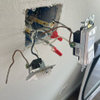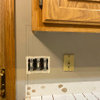Shocking fridge
lindakimy
16 years ago
Related Stories

COLORYou Said It: ‘Adding Color Is About So Much More Than Shock’ and More
Highlights from the week include color advice, Houzzers helping Houzzers and architecture students building community housing
Full Story
HOUSEKEEPINGHow to Clean Your Fridge, Inside and Out
Keep your refrigerator clean and fresh, while you gain storage space and lose those ‘UFOs’
Full Story
REMODELING GUIDESGet the Look of a Built-in Fridge for Less
So you want a flush refrigerator but aren’t flush with funds. We’ve got just the workaround for you
Full Story
GREEN BUILDINGThe Big Freeze: Inventors Break New Ground to Keep Things Cool
Old-fashioned fridges can be energy guzzlers, but there are more eco-friendly ways of keeping food fresh, as these global innovations show
Full Story
KITCHEN DESIGNStay Cool About Picking the Right Refrigerator
If all the options for refrigeration leave you hot under the collar, this guide to choosing a fridge and freezer will help you chill out
Full Story
INSIDE HOUZZHouzz Prizewinners Take Their Kitchen From ‘Atrocious’ to ‘Wow’
A North Carolina family gets the kitchen they always wanted — and not a minute too soon — courtesy of the Houzz sweepstakes
Full Story
GARDENING GUIDES5 Unsung Wildflowers That Thrive in Dry Shade
Turn shady problem spots into garden idylls with with these prolific, easy-care bloomers
Full Story
BUDGET DECORATINGBudget Decorator: A Most Affordable Gallery Wall
Need to fill a wall on the cheap? See how to make use of something pretty cool you may already have
Full Story
HOUZZ TOURSHouzz Tour: Warehouse Conversion in East London Sees Full Potential
Functional spaces, an open floor plan and optimized storage units transform this warehouse into an efficient small home
Full Story
DECORATING GUIDESLighten Up — or Brighten Up — With Yellow
You can use this versatile color to create a buttery backdrop, add a zesty accent or make a bold design statement
Full Story








jason1083
texasredhead
Related Professionals
Bay City General Contractors · Big Lake General Contractors · Makakilo General Contractors · Miami Gardens General Contractors · North Lauderdale General Contractors · Parkville General Contractors · Phenix City General Contractors · Greenville Solar Energy Systems · Bay Point Home Automation & Home Media · Burlingame Home Automation & Home Media · Coronado Home Automation & Home Media · Jollyville Home Automation & Home Media · Manhattan Beach Home Automation & Home Media · Town 'n' Country Home Automation & Home Media · Wilmington Home Automation & Home Mediatom_o
zap_ping_pow
texasredhead
billhart
spencer_electrician
lindakimyOriginal Author
brickeyee
billhart
lindakimyOriginal Author
zap_ping_pow
texasredhead
spencer_electrician
cobraguy
lindakimyOriginal Author
cobraguy
talley_sue_nyc
brickeyee
talley_sue_nyc
cookie8
gilshultz
billhart
texasredhead
sbrn33
gilshultz
Kelly666_gmail_com
gilshultz
kelly_again